Evangelicals
If you have read books like Drew Westen’s The Political Brain, you might be forgiven for raising an eyebrow at this headline. A large body of work has emerged over the past few years that suggest that we vote with our hearts, rather than our heads. Policies, this body of work says, matter far less than our gut reaction to a candidate, their character and the party we naturally align ourselves with.
So to those who agree with this research, the results of a new report from the Barna Group might be surprising. Across the board, a candidates’ position on issues is overwhelmingly more important than their character, their party affiliation or their religious faith.
In yesterday's New York Times, professor and author T.M. Luhrmann examined how Democrats can speak to evangelicals more effectively:
To be sure, they won’t connect to every evangelical. But the good news for secular liberals is that evangelicals are smarter and more varied than many liberals realize. I met doctors, scientists and professors at the churches where I studied. They cared about social justice. They cared about the poor. In the aftermath of Hurricane Katrina, many of them got into their cars and drove to New Orleans. This is a reachable population, and back in 2008, a quarter of white evangelicals voted for Mr. Obama. Democrats could speak to evangelicals more effectively if they talked about how we could develop our moral character together as we work to rebuild our country.

The statistics, some evangelicals say, can no longer be ignored.
Eighty percent of young evangelicals have engaged in premarital sex, according to a new video from the National Association of Evangelicals. and almost a third of evangelicals’ unplanned pregnancies end in abortion.
It’s time to speak honestly about sex because abstinence campaigns and anti-abortion crusades often aren't resonating in their own pews, evangelical leaders say.
Gabe Lyons thinks Christian culture warriors are on the wrong path.
His sixth annual Q Conference, which opens today in Washington, D.C., is an attempt to do things differently. With 700 participants gathered in a stately downtown auditorium, Lyons will play host to a distinct kind of Christian conference, one that seeks a respectful, constructive conversation on a host of issues confronting the nation.
Q, which stands for “question,” will allow 30 different culture leaders — from New York Times columnist David Brooks to Florida megachurch pastor Joel Hunter — to present their ideas for the common good during a two-and-a-half day confab.
“We feel we have a role to play in renewing the culture and holding back the effects of sin,” said Lyons, founder of Q, a nonprofit organization based in New York City. “We’re not to do it in an antagonistic way. We hope to do it in a hopeful way that gives witness to the rest of the world in how things ought to be.”
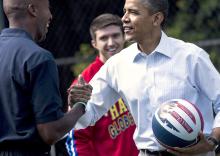
In a video address Tuesday, President Obama told hundreds of young evangelical Christian leaders gathered at the Q Conference in Washington, D.C., that they had a partner in the White House in their humanitarian and social justice efforts.

New research released today by the Pew Forum shows that the American public are becoming increasingly anxious of the amount of religious language being used by their public officials.
More people now say that there “has been too much expression of religious faith and prayer from political leaders” (4 in 10) than say that there has been too little (3 in 10). This figure is up nearly 10 percent from 2010 figures.
Supporters of former Pennsylvania Senator and presidential candidate Rick Santorum are the least concerned by the use of religious language by politicians, with 55 percent of them believing that there is too little expression of religious faith and prayer by religious leaders. Amongst Democrats or those who lean in that direction, a majority believe that religious language is invoked too often by political leaders.
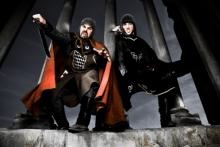
The Democratic sweep of Congress in 2006 and President Obama's election in 2008 convinced many people the religious right had been defeated and discredited. They believed it was time to "move on," a ubiquitous but dangerous phrase that often blinds people to unpleasant realities.
The truth, however, is that the religious right, Christian Reconstructionism and Dominionism have never gone away. And now they're back — "big time," as Dick Cheney might say.
In the 2012 presidential election, the Christocrats are out in force on many fronts: trying to eliminate prenatal care and all forms of contraception; defunding breast cancer screening; opposing civil rights for same-sex couples; contesting evolution and substituting creationism in public schools; denying the reality of global climate change; and discrediting the "lame stream media."

More U.S. Kids Living In High-Poverty Areas: Study; Debunking Poverty Myths And Racial Stereotypes; How Does A Conservative Evangelical Become A Corporate Tool Supporting A System That Coerces Apple's Suppliers' Workers To Have Abortions? (OPINION); Gingrich Joins With Arizona Faith Leaders To Court Latinos; Why Are Young People Leaving Evangelical Christianity?

Evangelicals' Lock On The GOP Cracks; Syria Crisis: Army Steps Up Homs Shelling; Diamond Jubilee: Queen Celebrating 60-Year Reign; Evangelicals And The US Election: A View From The Outside; The New Christian Abolition Movement; Voters Willing To See US Attack Iran Over Nuclear Weapons; For Some Black Women, Economy And Willingness To Aid Family Strains Finances; John McCain Slams Mitt Romney's 'Self-Deportation,' Advocates 'Humane Approach' To Immigration.
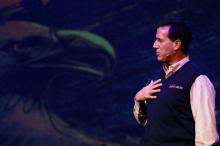
With the Iowa caucus, the "First in the Nation" New Hampshire primary, and South Carolina's primary now behind us, the field of contenders for the Republican nomination continues to shrink. I've watched with great interest as the spectacle rolls on and a parade of non-Romney's (Non-Roms, going forward) rhythmically rise and fall. What is perhaps most interesting about the current frontrunners is the lack of an obvious evangelical candidate. For all the talk that we hear about the importance of the evangelical vote, one would suspect at least one of the potential nominees to be, you know, an evangelical.
But Michele Bachmann is out of the race after a promising start in the Iowa straw poll. Perry, whose entrance into the race as a more "electable" evangelical candidate may have contributed to Bachmann's quick downfall, all but eliminated himself in a number of now infamous debate flops. That leaves one not particularly religious Baptist, two Roman Catholics, and a Mormon. Rick Santorum, a Catholic, is perhaps the most socially conservative and thus the most evangelical-looking of the Non-Roms, but many evangelicals have a deep mistrust of Catholics, so it is doubtful that, as they did in Iowa, evangelicals will support him despite his Catholicism.
So what happened here? Back in 2004, when talking about the evangelical vote was all the rage, one could presume that evangelicals were a unified political front—that denominations or non-denominations within evangelicalism didn't matter, theological differences were moot, and ending abortion was enough to tie them all together. The problem with this presumption is that it was never true. There was never one kind of evangelical. If there was, self-identified evangelicals wouldn't have to add a definition or disclaimer every time they identify as such.

Nikki Haley Endorses Mitt Romney For President; Lawmakers Agree on Spending Bill, Avoid Shutdown; Omaha Tri-Faith Initiative Has Unique Approach To Interfaith Relations; Christopher Hitchens Has Died; Did Bachmann Just Save Romney?; Wikileak suspect wants recusal; Health Care Experts Warn That Wyden/Rayn Plan Will End Guaranteed Access To Care For Seniors; New Evangelicals, Old News.

Earlier this month, Sojourners board member and former General Secretary of the Reformed Church in America, Wes Granberg-Michaelson, journeyed to Cuba with a delegation of religious leaders from the National Council of Churches.
Their visit culminated in a joint declaration celebrating signs of unity between the U.S. and Cuban churches. Sixteen representatives of U.S. National Council of Churches member communions were in Cuba November 28 through December 2 meeting with Cuban church and political leaders, including President Raúl Castro.
The delegation, which Cuban church leaders said was the highest ranking U.S. church group to visit the island in their memory, was led by the Rev. Dr. Michael Kinnamon, NCC general secretary. The joint statement by the churches declared that normalization of relations between the U.S. and Cuba would be in the best interest of both nations, and the leaders called for the resolution of three humanitarian issues “which cause unjustifiable human misunderstanding and suffering.” Foremost among the issues is the 53-year-old U.S. economic embargo of Cuba that dates back to the administration of President John F. Kennedy.
Read a series of dispatches from Granberg-Michaelson inside God's Politics.

GOP Candidates Fight Over Future Of Immigration Reform; The Letter From Evangelical Iowa; Evangelical Good News For Romney?; Child Poverty Rises In 96 Of Top 100 School Districts Since 2007; Undocumented Migrant Whose Lack Of Hope Drove Him To Suicide; Does Your Aid Count?; Is Tim Tebow Performing Miracles? (OPINION)

In 'God's Country': Voting Wallets Over Religion. Why Evangelicals Forgive (Republican) Sex Scandals. The Gospel According To Herman Cain. Pope Asks African Catholics To Be ‘Apostles Of Reconciliation.’ Super Screwed. Congress May Try Blocking Cuts If Debt Panel Fails. Too Much Violence And Pepper Spray At The OWS Protests: The Videos And Pictures.
Both Colson and Land are such diehard fans that they can -- and did, during conversations with Boorstein -- quote lines from Allen's movies.
Can you imagine Land, with his low Texas drawl, reciting Allen's famous monologue from Annie Hall?:
"The other important joke for me is one that's usually attributed to Groucho Marx but I think it appears originally in Freud's Wit and Its Relation to the Unconscious - and it goes like this. I'm paraphrasing. I would never want to belong to any club that would have someone like me for a member. That's the key joke of my adult life, in terms of my relationships with women."
Yeah, me neither.

New regulations increase accountability and boost quality in Head Start programs. Economic statements from the GOP presidential contenders. "Occupy" groups plan march from New York City to Washington, D.C. Our expensive, expanding nuclear weapons complex. Evangelicals call for nuclear cutbacks. Mississippi rejects abortion amendment. Ohio repeals anti-union law. And is Occupy Wall Street overshadowing itself?
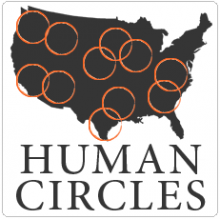
The New York City Human Circle will be replicated throughout across the nation, when faith leaders host Human Circles as members of the Sojourners National Mobilizing Circle, which is bringing together faith and community leaders to organize faith-rooted actions in their communities.
The purpose of these circles is not only to lobby for the poor but also with them.
Tonight, Sojourners and the Ethics and Religious Liberty Commission are co-sponsoring an event to discuss religion and the 2012 elections. Rev. Wallis and Dr. Richard Land will delve into what they believe the religious issues will be and should be from now until election day.
The event is already turning some heads. A Washington Post article by Michelle Boorstein summed up the unique nature of the event in a headline, "Evangelical opposites to hold discussion on 2012 presidential race."
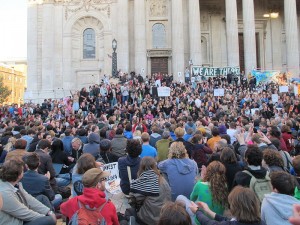
On Sunday (10/30), the Anglican Bishop of London, the Rt. Rev. Dr. Richard Chartres, met with Occupy London protesters who have encamped for several weeks now on the ground of St. Paul's Cathedral in London, in an ongoing attempt to get the demonstrators to leave church grounds.
Chartres wants the Occupiers to vacate cathedral property and stopped short, in an interview with the BBC yesterday, of saying he would oppose their forcible removal. Other British clergy, however, are rallying behind the demonstrators, saying they would physically (and spiritually) surround protesters at St. Paul's with a circle of prayer or "circle of protection."
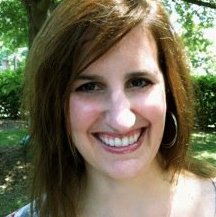
When I applied for a job at CNN in the 90s, and told the interviewer that I had interned with an evangelical magazine called Christianity Today, his response was, "If it's Christian, it isn't journalism."
Over the years that expanded to, "If it's evangelical, it's Republican. Or Jerry Falwell. Pat Robertson. The Tea Party. Wrapped in a Patriotic Flag. White People. Derivative, cheesy music. Big Money. Big Hair." Fill in the rest of the blanks.
Are those labels a distortion of what it means to be an evangelical? Of course they are. Yet they are how evangelicals are perceived, rightly or wrongly (I personally think it's a mixture of both), in our society.